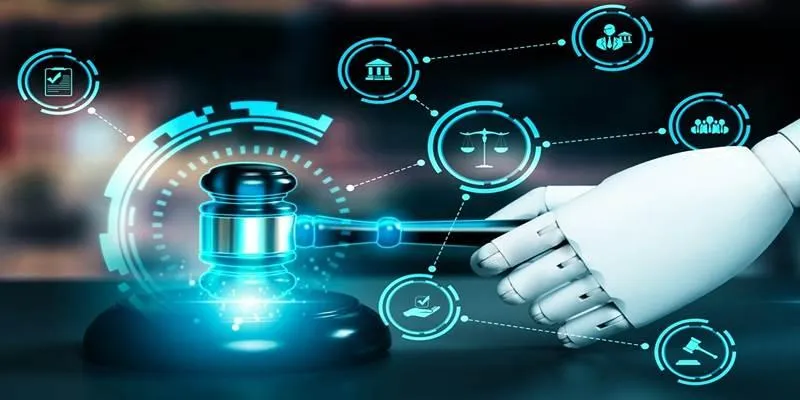The legal industry is undergoing a significant transformation. With the integration of artificial intelligence (AI), law firms and in-house legal teams are enhancing efficiency and accuracy in their operations. Tasks that previously consumed hours or even days can now be completed in minutes using advanced legal tech tools. From document review to case outcome prediction, AI is revolutionizing the way lawyers function. This post explores how AI supports legal teams , enhances workflow efficiency, and minimizes time spent on repetitive tasks.
Understanding AI in the Legal Industry
In the legal sector, AI involves using computers to perform tasks traditionally carried out by humans. These computers are trained to comprehend legal language, analyze documents, and provide valuable insights.
Key applications of AI in law include:
- Document review and contract analysis
- Legal research
- Predictive analytics
- Case outcome prediction
- Compliance monitoring
- Automation of repetitive tasks
AI enables legal teams to handle vast amounts of information swiftly and accurately, allowing lawyers to focus more on strategy and client relationships.
How AI Enhances Legal Team Efficiency

AI is not replacing lawyers; rather, it assists them in performing their duties more effectively and efficiently. Here’s how AI impacts daily legal work.
Accelerated Document Review and Analysis
Document review is one of the most labor-intensive tasks in the legal realm. Legal teams often sift through thousands of pages of contracts, emails, and reports. AI tools can scan, analyze, and summarize legal documents far more quickly than humans. These tools highlight critical information and flag risks or missing clauses.
Benefits include:
- Significant reduction in manual effort
- Lower risk of overlooking vital details
- Enhanced accuracy and consistency
Advanced Legal Research
Advanced legal research is another area where AI excels. Traditionally, lawyers invested considerable time in reading case laws and legal articles. With AI-powered search engines, legal teams can now obtain precise results in seconds. These tools utilize natural language processing (NLP) to understand queries, even if they are not perfectly phrased.
Implications for legal teams:
- Rapid access to relevant cases and laws
- Improved legal arguments and strategies
- More time to dedicate to clients
Contract Management and Automation
AI assists in drafting, managing, and reviewing contracts. Legal tech platforms enable teams to automate contract creation using templates and intelligent data input. Once a contract is in the system, AI can track its lifecycle, flag deadlines, and even send reminders.
Resulting benefits:
- Improved contract organization
- Fewer errors or overlooked deadlines
- Streamlined approval processes
AI in Case Predictions and Risk Assessment
One of the most exciting applications of AI in law is predictive analytics. These systems analyze past case data to estimate outcomes for ongoing cases.
Before going to trial, lawyers can use AI to:
- Predict the likelihood of winning or losing a case
- Gauge how long the case might take
- Assess the cost and risk involved
This information aids clients in making informed decisions about settling or pursuing litigation.
Popular AI Tools in the Legal Industry
Numerous legal tech companies offer AI-powered tools that support various aspects of legal work. Popular tools include:
- ROSS Intelligence – For legal research using NLP
- Kira Systems – For contract review and analysis
- Luminance – For document analysis and risk detection
- LexisNexis and Westlaw Edge – For fast, AI-enhanced legal research
- LawGeex – For automated contract review
These tools are designed to seamlessly integrate into the daily workflows of legal professionals, saving time and improving work quality.
AI Applications Across Various Industries
Legal AI is being adopted across a wide range of sectors:
- Banking and Finance: For contract reviews and regulatory compliance
- Healthcare: To manage patient privacy agreements and comply with HIPAA
- Technology Firms: To handle data privacy, IP law, and international regulations
- Retail and Manufacturing: For supplier contract automation and risk assessments
In each of these industries, AI tools help legal teams minimize legal exposure and ensure smoother operations.
Advantages of AI in Law Firms and Legal Departments

AI offers numerous benefits to legal professionals, whether they operate in large law firms or small legal teams.
Key benefits include:
- Increased efficiency – AI accelerates repetitive and time-consuming tasks
- Cost savings – Reduces the need for manual labor and lengthy billable hours
- Greater accuracy – AI tools are less prone to errors in data-heavy tasks
- Improved client service – Lawyers can concentrate on strategy and communication
- Data-driven insights – Assists lawyers in making informed, intelligent decisions
Challenges and Ethical Considerations of AI in Law
Despite the numerous advantages, it’s crucial to acknowledge AI’s limitations and challenges.
Primary concerns include:
There are ethical and practical questions surrounding AI use in the legal field.
- Data privacy – AI tools often handle sensitive information
- Algorithmic bias – AI systems may reflect biases present in their training data
- Lack of transparency – Understanding how AI tools make decisions can be challenging
- Dependence on technology – Over-reliance on AI might impede critical thinking
Lawyers must balance AI tools with their legal expertise to ensure ethical practice.
Conclusion
Artificial intelligence (AI) is reshaping how legal teams operate behind the scenes. From large law firms to in-house departments, AI tools are streamlining everyday legal tasks, making them faster, easier, and more accurate. Legal teams now use AI for reviewing contracts, tracking compliance, conducting legal research, and managing documents. These tools save time, reduce human error, and allow professionals to concentrate on high-level strategy. As legal complexities increase, the demand for smarter tools becomes increasingly essential.
 zfn9
zfn9























